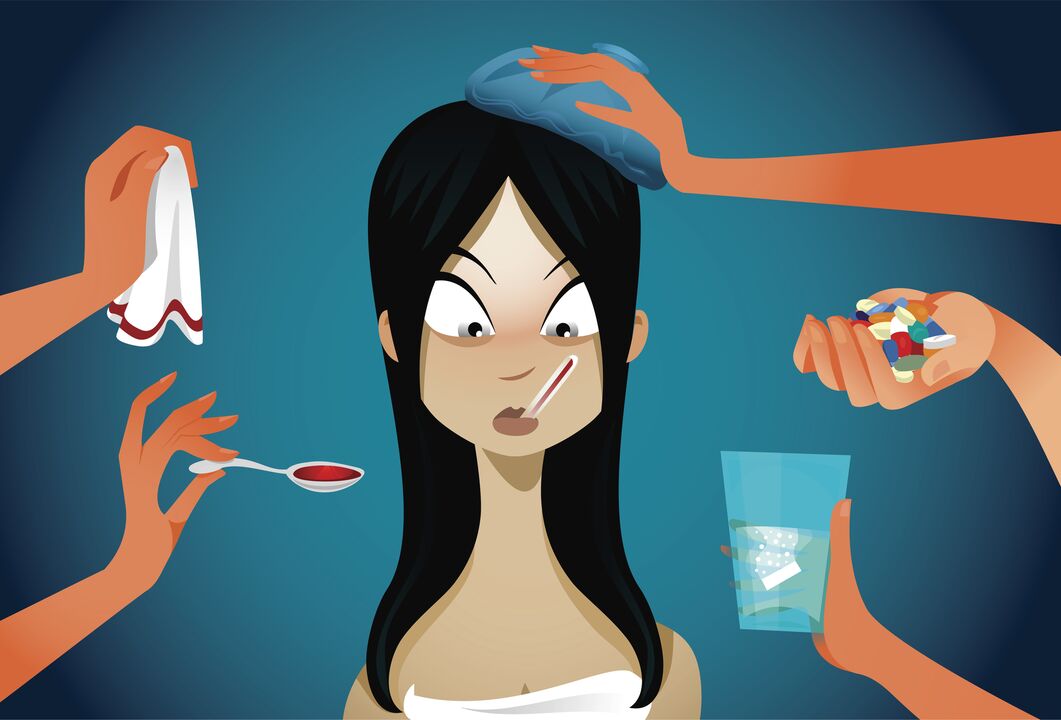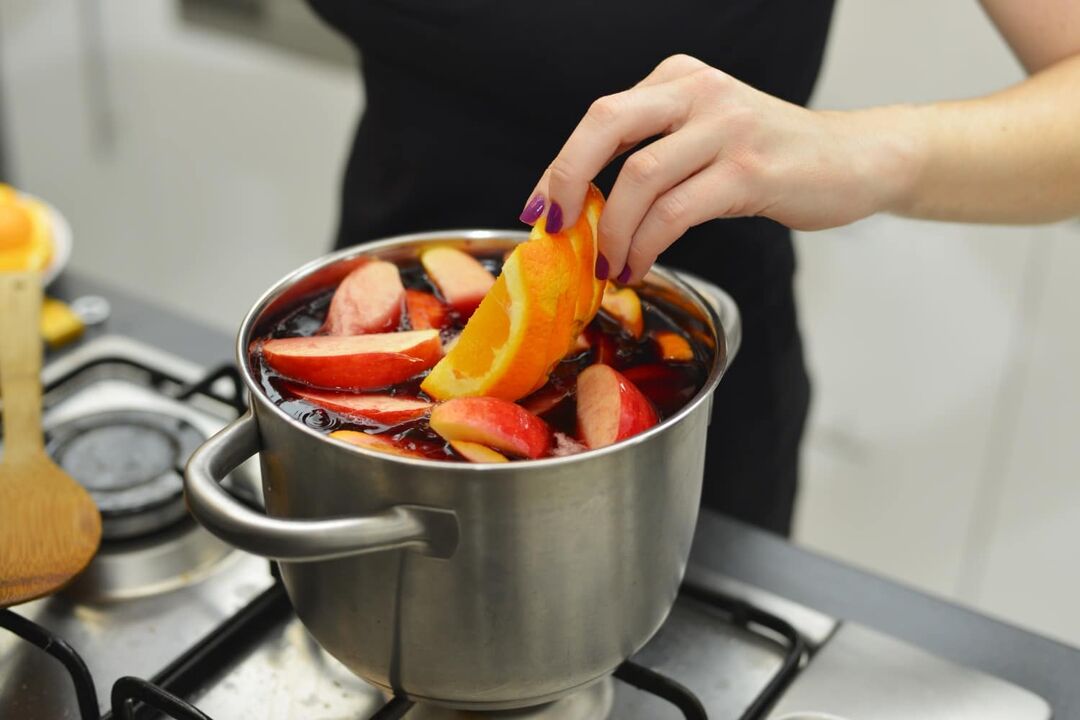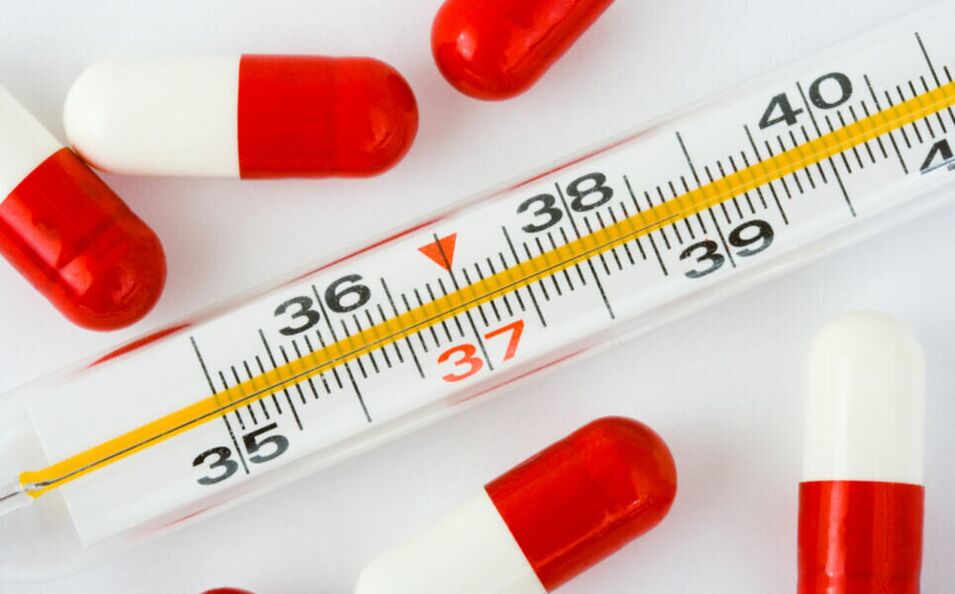Most of the population of our country firmly believes that during a cold, drinking alcoholic beverages can significantly help the body on its way to recovery. But this is a big mistake. Ethanol not only won't help you get around any faster, it can do more harm than good. So can you drink at temperature while cold? We will have to look into this thoroughly.

Ethyl alcohol and colds
The myth that alcohol helps the body fight cold is based on its warming effect on the body. But it only seems so, because after entering the bloodstream, ethanol stimulates vasodilation, and this leads to blood flow to the skin. A person feels warm, but such sensations are deceiving, because only the skin is warmed, and heat is quickly released to the environment and causes heat loss.
Don't drink alcohol when it's cold. The feeling of false warmth is emerging very dangerous, people do not feel the real temperature.
If you drink while you have a cold, strangely, the virus and bacteria will not disperse to the sides and continue to exist. Alcohol only negatively affects the functioning of the immune system, leaving the body weak and unable to fight off infections. The systematic intake of alcoholic beverages during an illness will increase the number of pathogenic bacteria, so the course of the disease will only worsen.
But among doctors there is also an opinion that a glass of red wine can be a great cold ward. Considering that many people do not know how to drink cultured, it is better not to think of such prevention.
Ethyl alcohol and temperature
Increased temperature during illness is not a symptom but a response of the body to the entry of foreign agents. At a high rate on the thermometer, the immune system can destroy disease-causing organisms. If the temperature does not exceed 38. 5 degrees, then you should not rush to beat it, let the body fight and form immunity rather than interfere. And alcohol can become a huge obstacle.
Under all conditions, drinking alcohol is undesirable, but even more so when the temperature is present. If, with a measurement in the range of 37-37, 5 ° C, this is not yet too dangerous, then when using a thermometer 38, you do not need to risk your health. Alcohol and temperature are incompatible for the following reasons:
- When the temperature is high, the body is dehydrated, so you need to drink a lot of water, alcohol will only aggravate the situation. Ethanol dehydrates the body even more, complicating the course of the disease.
- During the illness, the body begins to work in emergency mode, the heart rate increases, and if you drink even during this period, the heart will be under terrible strain. The pulse accelerates, blood pressure rises, the entire cardiovascular system is adversely affected by alcohol.
- Drinking alcohol at high temperatures can cause unexpected reactions in the body. At first, it may even decrease a little, but then it will increase even more and cause a decline in health.
It should always be remembered that not only can a cold be accompanied by a soaring temperature, but also cause more serious illnesses. And drinking with them can be even more dangerous.
Why does alcohol raise the temperature?
The fact that alcohol dilates blood vessels is not a secret. But what are the reasons that lead to an increase in temperature when drinking alcohol? Try answering this question:
- Ethanol dilates blood vessels, which can lead to a spike in temperature.
- The body in some people can perceive alcohol as an allergen and react accordingly with a rise in temperature, a rash on the skin.
- There are times when congenital ethanol intolerance can also raise the temperature.
- Alcohol intolerance can develop throughout life as a result of certain diseases or an allergic reaction accompanied by a high fever.
- Do not forget that alcoholic beverages can contain various impurities that can cause allergic reactions when the temperature is increased.
- Alcohol can cause stomach upset, gastrointestinal problems, and fever.
- The intoxication of the body with ethanol and its breakdown products is another possible reason that after drinking alcohol during a cold, the readings on the thermometer will increase.
Therefore, it is better not to take risks and not test the strength of the body. Calling a doctor makes a lot more sense than trying to quit drinking.
Exception when drinking because of a cold
If the temperature does not exceed 37. 5 ° C, then you can afford to drink alcohol, but only exceptional. This applies to pickled wine. The drink is alcohol warmed to 70° and combined with cinnamon, ginger and cloves. This drink provides the body with useful substances and trace elements, which are very important during illness. As for ethyl alcohol, when heated, it practically evaporates, so its content in the finished drink drops to zero.
If there is a temperature, it is better to let the wine cool down a bit.
Beer can be used in place of alcohol, but the drink must also be heated thoroughly to allow the ethanol molecules to evaporate and add seasoning. Beer contains vitamin B, vitamin C. But don't forget, a glass of wine or crushed beer is enough.

Basal temperature and alcohol
Basal temperature charts are often drawn up by women who are trying to get pregnant. Egg cell maturation can be easily tracked, increasing the chances of fertilization. For accuracy, such a chart is fixed for a long time so that all deviations can be tracked.
Women should keep in mind that drinking alcohol can significantly affect basal temperature. Indicators 37. 1-37. 3 symbolized that a new life was being born in a woman's body. Drinking alcohol can give rise to a false temperature and the readings cannot be considered reliable.
Is it possible to combine antipyretics and alcohol?
A sober person understands that any medication should not be taken at the same time as drinking alcohol. This also applies to antipyretic drugs. What happens if you take alcohol and a pill to bring down a fever? The following complications may occur:
- The likelihood of side effects increases many times over. If they might not be present in a sober person, when combined with ethanol, the risk is increased many times over.
- Ethyl alcohol enhances the detoxifying effect of the drug on the liver, trust me, the agency will not thank you for such a gift.
- Even drinking beer for colds and fever-reducing therapy can cause nausea and vomiting.
How long can you take the medicine after drinking alcohol? The possible answer is as follows: no earlier than 4-6 hours, if a glass of wine is drunk. Naturally, with a large amount of alcohol being consumed, the interval should be increased even more.

Complications and consequences of post-alcohol fever
As it turns out, alcohol doesn't lower the temperature, it raises it. This can lead to the following disastrous consequences:
- There is a risk of damage to the nervous system.
- Risk of severe, life-threatening dehydration.
- Blood circulation is impaired.
- Blood pressure spiked.
- The blood becomes viscous and there is a risk of clotting.
Don't delay calling your doctor if your temperature doesn't drop for a few days and stays high. This situation becomes dangerous for the work of the whole organism. It is urgent to lower the temperature if:
- Convulsions were observed.
- Patients with chronic pathology of the cardiovascular system.
- There are lung diseases in the diagnosis.
- There are diseases of the nervous system and mental abnormalities.
- Patient has diabetes.
It should be borne in mind that harm can be caused not only by drinking alcohol in the person, but also in the form of rubbing, and this is also often done. It is better to leave cold treatment to specialists or proven remedies and not let your body test more.

































